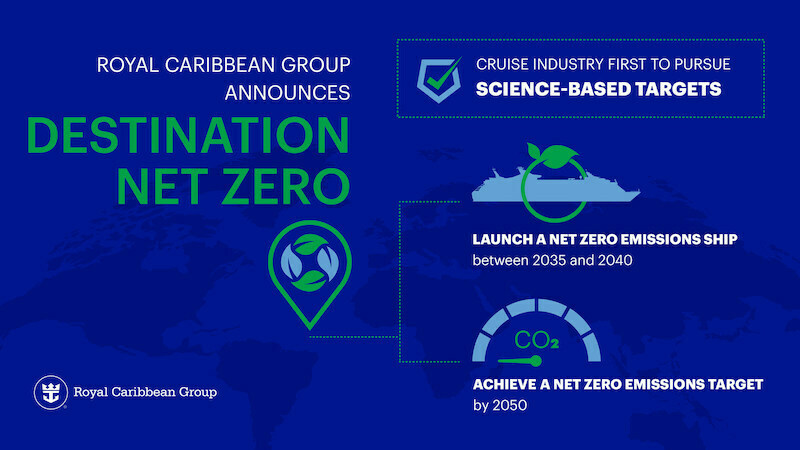Royal Caribbean Group has announced the Destination Net Zero program, a comprehensive decarbonization strategy that includes pledging to establish Science-Based Targets (SBT) and achieving net zero emissions by 2050.
“Decades ago, we set out on a course to advance sustainability; our vision now is to realize carbon-free cruising over the next two decades,” said Richard Fain, chairman and CEO at Royal Caribbean Group. “Today we are announcing the most important destination of all in our company’s history – Destination Net Zero – an ambitious strategy to cut emissions, protect our oceans, and ensure the viability of the hundreds of destinations that our guests and crew members care deeply about.”
Royal Caribbean Group’s Destination Net Zero builds on decades of progress and a deep sense of responsibility to embed sustainability throughout the organization. Over 18 to 24 months, the cruise company said that it will develop goals to be validated by the Science Based Targets initiative (SBTi), which is the first such pledge for the cruise industry.
The work will begin following the publication of SBTi’s marine transport methodology. Science-based targets show companies how much, and how quickly, they need to reduce their greenhouse gas (GHG) emissions to help limit global warming.
Along the journey to net zero, key milestones will be critical to making progress. One of Royal Caribbean Group’s most ambitious milestones is the delivery of a net zero cruise ship by 2035. To achieve these ambitions, the company said that it will rely on strong partnerships with governments, suppliers and shipyards to develop alternative and accessible fuels and technology.
The company’s focus on achieving these measurable goals builds on its track record of designing and operating some of the most energy efficient ships on the seas. Thanks to optimized hull design and system upgrades such as AC chillers utilizing 30-40 percent less energy, Royal Caribbean Group has consistently delivered a new generation of ships 20-25 percent more efficient than their predecessors.
From Silversea Cruises’ Project Evolution – the hybrid-powered ship set to debut summer 2023 – to the wind farm in Kansas that will offset up to 12 percent of our scope 1 and 2 emissions per year, Royal Caribbean Group said that it is already executing on its Destination Net Zero strategy to drive the development of emissions-reducing technology and alternative fuel solutions.
“Royal Caribbean Group has a history of innovating in every aspect and level of the company,” said William K. Reilly, chairman at Royal Caribbean Group’s board of directors’ safety, environment, and health committee. “This is another important step on the serious and ambitious path to preserve the health and allure of the sea and the beauty of the oceans.”
According to a press release, Destination Net Zero’s four-pronged approach includes:
1. Modernization of Royal Caribbean Group’s global brands fleet through the introduction of 13 new energy-efficient and alternatively fueled vessels, including its recently announced Project Evolution.
2. Continued investment in energy efficiency programs for its fleet, including energy saving technologies, enhanced data systems and digitalization.
3. Development of alternative fuel and alternative power solutions.
4. Optimized deployment and integration of strategic shore-based supply chains.
Royal Caribbean Group said that its journey to reducing its environmental footprint began nearly 30 years ago with Save the Waves, an effort that grew from a recycling program into a company-wide approach to embedding challenging, achievable, measurable sustainability targets into the “bedrock of the company’s culture.”
In 2016, the group built on this legacy of progress and commitment by embarking on a partnership with World Wildlife Fund (WWF). With the goal of ensuring the long-term health of the oceans and fulfilling a vision of more sustainable cruising, Royal Caribbean Group established initial 2020 targets to reduce its environmental footprint, support ocean conservation globally and raise awareness among the company’s more than 5 million passengers about the importance of ocean conservation. Earlier this year, it announced it had met or exceeded its 2020 goals, with the exception of a sustainable seafood sourcing target (now expected to be met by 2022) that was impacted by the travel suspension from the pandemic.
“Destination Net Zero will help guide our decision-making in the years to come and builds on Royal Caribbean Group’s continuous improvement mantra,” said Silvia Garrigo, Royal Caribbean Group chief Environmental Social Governance (ESG) Officer. “While we may not have all the answers now, this comprehensive company-wide strategy amplifies our focus on long-term emissions reduction and provides us a roadmap for how to get there.”
“Ensuring the long-term health of our oceans requires collective action to effectively address climate change and limit warming to 1.5C,” said Carter Roberts, president & CEO of WWF. “Through our partnership, Royal Caribbean Group has been on a journey to improve their overall sustainability. Achieving net zero emissions no later than 2050 will require innovation and collaboration at scale, and WWF looks forward to working together to make progress toward this milestone.”




